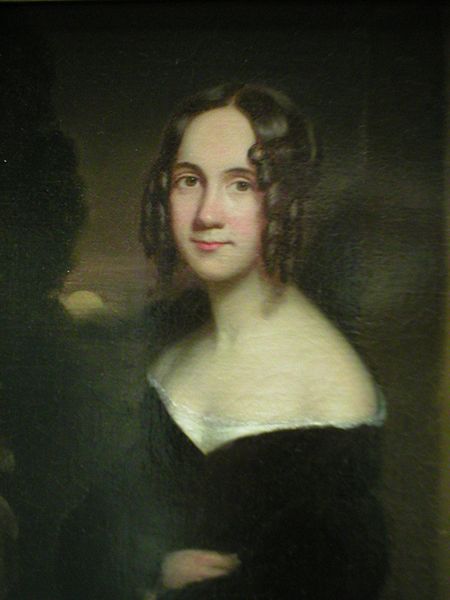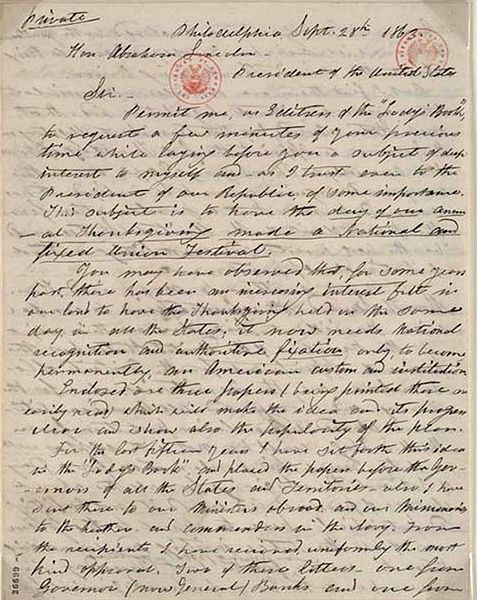Sarah Josepha Hale & Thanksgiving

Portrait of Sarah Josepha Hale by James Reid Lambdin around 1831. Photo Credit: Richard’s Free Library
Sarah Josepha Hale, a writer and editor born in 1788 in New Hampshire, is known as the “Godmother of Thanksgiving” for her efforts in getting the day recognized as a national holiday. Hale is thought to have written the first detailed description of the first Thanksgiving experienced by the settlers of Massachusetts Bay in her 1827 novel Northwood. She ends with the following:
[It] is considered as an appropriate tribute of gratitude to God to set apart one day of Thanksgiving in each year, and autumn is the time when the overflowing gamers of America call for this expression of joyful gratitude.
In 1847, Hale’s crusade to get Thanksgiving a recognized holiday began. Through editorials in Godey’s Lady’s Book, in which Hale was the literary editor of, she emphasized how Thanksgiving would reiterate religious beliefs and unify the country. As the United States edged closer to the Civil War, Hale became ardent that Thanksgiving – as a national holiday – would strengthen the weakening bond between the North and the South.
Everything that contributes to bind us in one vast empire together, to quicken the sympathy that makes us feel from the icy North to the sunny South that we are one family, each a member of a great and free Nation, not merely the unit of a remote locality, is worthy of being cherished. We have sought to reawaken and increase this sympathy, believing that the fine filaments of the affections are stronger than laws to keep the Union of our States sacred in the hearts of our people . . . We believe our Thanksgiving Day, if fixed and perpetuated, will be a great and sanctifying promoter of this national spirit.

Letter from editor Sarah Josepha Hale to President Abraham Lincoln discussing the need for a national Thanksgiving holiday. Photo Credit: Library of Congress
Her crusade was not deterred when war broke out. Hale decided to try a different method. She went straight to the man at the top. On September 28, 1863, Hale wrote a letter to President Abraham Lincoln. Not only did he read her letter, he also took action. On October 3, President Lincoln issued a proclamation urging Americans to observe the last Thursday in November as a day of “Thanksgiving.” The next year, he issued another Thanksgiving proclamation. After Lincoln’s death, President Andrew Jackson followed in his predecessor’s footsteps and appointed a day of thanksgiving – although it was December 1st instead of the last Thursday of November.
Hale was not satisfied with just a presidential proclamation. Her next endeavor was to get Thanksgiving Day proclaimed as a national holiday by Congress. In another editorial, in 1871, she wrote about her reasoning behind getting Congress’ formal proclamation.
It is eminently fit that this National Holiday shall rest upon the same legal basis as its companions, the Twenty-second of February and the Fourth of July. As things now stand, our Thanksgiving is exposed to the chances of the time. Unless the President or the Governor of the State in office happens to see fit, no day is appointed for its observance. Is not this a state of things which calls for instant remedy? Should not our festival be assured to us by law?
We hope to see, before many months have elapsed, perhaps before our next Thanksgiving, the passage of an act by Congress appointing the last Thursday in November as a perpetual holiday, wherein the whole nation may unite in praise to Almighty God for his bounty and love, in rejoicing over the blessings of the year, in the union of families, and in acts of charity and kindness to the poor.
Hale died in 1879 at the age of 91 before seeing her second crusade to completion. It would not be for another seventy years later that the U.S. Senate and House of Representatives passed a bill establishing the fourth Thursday every November to be Thanksgiving Day. On November 26, 1941, President Franklin D. Roosevelt signed the bill into law. Recently, a new memorial for Sarah Josepha Hale was dedicated in her hometown of Newport, New Hampshire for her work to get Thanksgiving recognized as a national holiday and for her role a writer, magazine editor and fundraiser for Boston’s Bunker Hill Monument.
While her name may not seem familiar or the fact that she was nicknamed the “Godmother of Thanksgiving”, Hale was an accomplished writer with 30 published books – one of which was one of the first American novels to criticize slavery. However, she is most remembered for a poem she wrote and included in Poems for Our Children, her second book of poetry that was published in 1830. The poem is one of the most famous in the English language – “Mary Had a Little Lamb.”
Further Reading
National Women’s History Museum
Hope Greenberg, “Godey’s Lady’s Book,” University of Vermont.
Bonnie Hurd Smith, “Sarah Josepha Hale,” Boston Women’s Heritage Trail.
Peggy M. Baker, “The Godmother of Thanksgiving: The Story of Sarah Josepha Hale,” Pilgrim Society & Pilgrim Hall Museum, 2007.
Jon Kamp, “‘Thanks’ to Unsung Heroine Sarah Josepha Hale,” The Wall Street Journal, Nov. 26, 2013.









What a fascinating look at this woman’s life and all that she accomplished. And I loved how you ended it – sort of like Paul Harvey’s “The Rest of the Story.” Thanks so much for sharing this. Her life would make a terrific novel! (hint, hint…)
Thank you Melissa! She is quite something and I didn’t even touch on the fact that she was both for and against women’s suffrage. She was for better treatment and respect for women in the workplace but she also thought that women should be subservient to men. There were times she lambasted the suffragist movement. She was quite a complex woman. I grew up listening to Paul Harvey along with my dad. The comparison is quite humbling my friend! She would definitely make for a great novel subject! (wink, wink…)